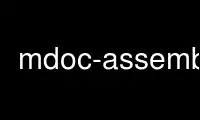
This is the command mdoc-assemble that can be run in the OnWorks free hosting provider using one of our multiple free online workstations such as Ubuntu Online, Fedora Online, Windows online emulator or MAC OS online emulator
PROGRAM:
NAME
mdoc assemble - Compile documentation for use in monodoc(1)
SYNOPSIS
mdoc assemble [OPTIONS]+ PATHS+
DESCRIPTION
mdoc assemble creates .tree and .zip files from PATHS for use in the monodoc(1)
documentation browser.
The input files must have a supported format, specified with the --format option.
The .tree and .zip files are copied into monodoc's sources directory, alongside a .source
file which is used by monodoc(1) to specify where the documentation should be displayed.
The .source file has the following format:
<?xml version="1.0"?>
<monodoc>
<node label="LABEL" name="PATH" parent="PARENT">
<node label="LABEL2" name="PATH2" />
<!-- ... -->
</node>
<source provider="PROVIDER" basefile="BASEFILE" path="PATH" />
<!-- other <source/> elements -->
</monodoc>
The /monodoc/node node is an optional node that specifies where in the monodoc tree the
documentation should be displayed, and //node elements may be nested to any depth to
create trees. //node/@label is the label that will be displayed within the monodoc tree.
//node/@name is the name of the monodoc tree node, and may be used as the value of the
/monodoc/source/@path value.
//node/@parent is the node name to use as the parent node.
$MONO_INSTALL_PREFIX/lib/monodoc/monodoc.xml contains a list of such names, and this can
be any //node/@name value. If the //node/@parent value isn't found, then it's inserted
under the "Various" tree node.
The /monodoc/source/@provider attribute specifies which format provider should be used
when reading the .tree and .zip files; this must correspond to one of the --format values.
The /monodoc/source/@basefile attribute specifies the filename prefix for the
documentation files. This must be the same prefix as used with the --out parameter.
There should be no filename extension on this value.
The /monodoc/source/@path attribute specifies the parent node in monodoc(1)'s tree view
where the documentation will be inserted. See the
$MONO_INSTALL_PREFIX/lib/monodoc/monodoc.xml file for a list of PATH values (the
//node/@name values), or it may be a //node/@name value in the same .source file.
Once the BASEFILE.source has been written, the documentation can be installed so that
monodoc(1) will display the documentation with the command:
cp BASEFILE.source BASEFILE.tree BASEFILE.zip \
`pkg-config monodoc --variable=sourcesdir`
OPTIONS
-f, --format=FORMAT
Specifies the documentation format used within PATHS. Valid FORMAT values include:
ecma, ecmaspec, error, hb, man, simple, and xhtml.
See the FORMATS section below for more information about these formats.
The default format (if none is specifed) is ecma.
The --format option may be interleaved with PATHS to change the format used for the
remaining parameters (until the next --format option is seen), e.g.:
mdoc assemble -o PREFIX A B --format=man C D --format=xhtml E
will assemble directories A and B with the ecma format, files C and D with the man
formt, and directory E with the xhtml format.
-o, --out=PREFIX
Specify the output file prefix. mdoc assemble creates the files PREFIX.zip and
PREFIX.tree.
-h, -?, --help
Display a help message and exit.
FORMATS
The following documentation formats are supported:
ecma
The Mono ECMA Documentation Format, an XML documentation format with one file per type.
See the mdoc(5) man page for more information.
ecmaspec
The Mono ECMA Specification Documentation Format. This is not the format you're looking
for; it is the format used to represent the ECMA-334 (C#) standard within monodoc(1). It
is not used to display class library documentation; for class library documentation, use
the ecma format.
error
The Error Documentation Format is used to present detailed error messages, and is used in
monodoc(1)'s "C# Compiler Error Reference" tree.
In this format, PATHS is a configuration file, containing the XML:
<ErrorProviderConfig>
<FilesPath>../../mcs/errors</FilesPath>
<Match>cs????*.cs</Match>
<ErrorNumSubstringStart>2</ErrorNumSubstringStart>
<ErrorNumSubstringLength>4</ErrorNumSubstringLength>
<FriendlyFormatString>CS{0:0###}</FriendlyFormatString>
</ErrorProviderConfig>
The elements mean:
/ErrorProviderConfig/FilesPath
Specifies where to look for files.
/ErrorProviderConfig/Match
Specifies the filename pattern to look for within the
/ErrorProviderConfig/FilesPath directory.
/ErrorProviderConfig/ErrorNumSubstringStart
Specifies where within the filename the error number starts.
/ErrorProviderConfig/ErrorNumSubstringLength
Specifies how many characters after /ErrorProviderConfig/ErrorNumSubstringStart to
use for the error number.
/ErrorProviderConfig/FriendlyFormatString
Specifies the formatting/display of the node in the monodoc(1) tree.
For each file found, it is converted to HTML with C# syntax coloring applied.
simple
The Simple Documentation Format file format recursively adds all files and directories
underneath PATHS. When displayed, HTML files are displayed as-is. Text files are
converted into HTML by translating each newline into an HTML <br> element. No other file
type is supported.
man
The Man Page Documentation Format displays groff man pages. (This is not a full groff
parser, and only handles the man page constructs used within the mono man pages.)
PATHS is a set of XML files containing:
<?xml version="1.0"?>
<manpages>
<manpage name="NAME" page="FILE" />
</manpages>
There may be multiple //manpage elements within the root /manpage element.
The /manpages/manpage/@name attribute contains the display name for the tree view node,
which is also the URL of the man page when using monodoc(1)'s Lookup URL command (before
prefixing with a man: prefix). Thus, if /manpages/manpage/@name contains mono(1), then
man:mono(1) can be used in the Lookup URL command to view the mono(1) man page.
The /manpages/manpage/@page attribute is the filename that contains the man page. If this
file does not exist, then /manpages/manpage/@name will not be displayed within the tree
view.
xhtml
The XHTML provider interprets PATHS as a Windows Help file XHTML TOC file and looks for
referenced documents to create the help source.
Use mdoc-assemble online using onworks.net services
